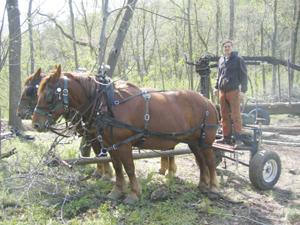 |
|
Forester Uses Animal Power to Protect the Environmentby KRISTEN ARMSTRONG, Staff Writer
|
|
| Foresters and loggers looking
to make a quick buck know what to do: take short-cuts at the expense of
the environment. But not everyone in the trade is short-sighted. Justin LaMountain, owner of Green Man Forest Management, practices his craft with a longer-term, environmentally conscious vision in mind, with the help of his two horses, Cherry and Birch. Rather than clear-cutting forests and working with machines harmful to nature, LaMountain uses animal power for a much lower-impact, restorative approach to logging. “Once you clear cut a forest, you don't have a forest anymore,” he said. “I implicitly reject this as a form of forest management.” By using his Suffolk draft horses, LaMountain avoids “the continuous compaction you get from a tract vehicle” and leaves behind only soft hoof prints. The horses are also “essentially solar-powered, and look towards reducing the fossil-fuel footprint,” he said. “No fossil fuels went into their production and what they do, and they fertilize the woods as they're working.” LaMountain also rejects high grading (marking and selecting the best trees to come out of the woods), because doing so “depresses the genetic quality of the forest” and “perpetuates the worst phenotypes.” Even though, in the short-term, he might not be making as much money as other loggers and foresters who take short-cuts, he believes you have to look at things with the lifespan of the tree in mind, and that, over time, his form of forest management and logging is the most economical. “A white oak doesn't reach maturity until it's 100-150 years old,” he said. “In the long run, the best way to manage [trees] for the most money, without compromising the needs of the system, is to promote the most valuable tree species and keep them growing at the fastest possible rate.” With a recent project at Locust Hill Farm on Zulla Road and Stoney Lonesome Farm in Gainesville, it seems that landowners are catching on to LaMountain's more sustainable approach to forestry, and he is eager to help them learn more about it. “I don't see much point in having an occupation that isn't improving the earth and the overall quality of life,” LaMountain said. “If you're not contributing, then what are you doing?” |
 Justin LaMountain is shown with his Suffolk draft horses, Cherry and Birch. (Photo by Kristen Armstrong) |